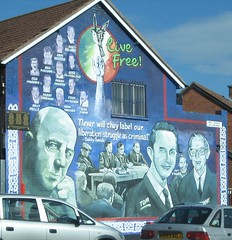One of the reasons why the British Armed forces have not been as disastrous as the US Forces in Iraq is their experience in Northern Ireland.
That is not to say that in any way they should stay in Iraq, but it is worth looking at conflict in Northern Ireland and gang warfare in Birmingham and using those experiences try to understand what is happening in Iraq.
I have uploaded some of the pictures I took of murals in Northern Ireland (not all of which are paramilitary murals) to flickr.
These are just two:


One is from the IRA, the other is from the UVF.
The first thing to understand about these conflicts is that they are strongly driven by emotions. The second thing is that sub-groups amongst each group also conflict with each other.
This story about the conflict between the UDA and UVF tells something about conflict within the protestant groups.
The main thing to understand is that there is an emotional drive to revenge that frequently goes far beyond a deterrent form of action.
Within Birmingham there are a number of gangs, happily not as influential as the paramilitary groups, but also armed to some extent. They do not have the same level of support in the communities in which they live that the groups in Northern Ireland have.
There is, however, still the same desire for revenge. In Birmingham if there has been a shooting then the gang members of the same gang that has been shot then have a desire to retaliate. Our challenge in Birmingham, which with the sterling efforts of Operation Ventara (a police gangs initiative) is to get the gangs to accept that the police should be allowed to take enforcement action against people who have shot their gang members.
This was the real challenge when the girls were shot in Aston in early 2003. It was a challenge to get the enforcement to operate through a judicial and investigative process rather an a tit-for-tat retaliation.
Now the issue in Iraq is to understand that really what is happening is a translation of Northern Ireland into Arabic. A big difference is neither side really want the occupation and many Iraqis resent the way in which the occupying forces are snaffling oil money. Obviously the conflict is far far more violent, but the factional nature of the conflict is similar. There is also the additional factor of more factions.
The same form of emotional resentment is building up. The new bombings are in a sense part of a sectarian battle that has gone on for centuries.
In the 1800s strife between the Muwahhiddun (also known as Wahabis) and Shi'a developed and in many ways we have that form of conflict today in Iraq.
The balancing point is that at which the Shi'a who are suffering many of these deaths switch into wanting the occupation to end so that they can act to protect themselves.
There are often two ways forward which can occur to take conflict forward. One is conflict resolution where matters are resolved on a step by step basis and issues are resolved through negotiation. The other is a mixture of increasing the balance of terror and the consequent ethnic cleansing that occurs as people move out of mixed areas into those in which they feel safe.
My fear about Iraq is that now so much damage has been done by the occupying forces that the balance of terror option is one which there is an emotional demand for amongst the patriarchs.
It is important always to remember that people may rationally want peace, but this can be trumped by an emotional desire for revenge. In what are essentially feudal societies this is something that can last for generations (and in Iraq has to some great extent already done so).
This times report includes the phrase “He had no obvious enemies, but he was a Shia from the Amiri tribe, and that was reason enough for him to be attacked.”
Sadly the same article uses the phrase "turf war".
In the mean time the ground troops particularly from the US forces will continue to increase the political temperature of ethnic conflict. This also spills over into the rest of the world.
What the US should try to understand, but I am sure that they won't is that they cannot make things any better by keeping ground forces in Iraq.
That is not to say that in any way they should stay in Iraq, but it is worth looking at conflict in Northern Ireland and gang warfare in Birmingham and using those experiences try to understand what is happening in Iraq.
I have uploaded some of the pictures I took of murals in Northern Ireland (not all of which are paramilitary murals) to flickr.
These are just two:


One is from the IRA, the other is from the UVF.
The first thing to understand about these conflicts is that they are strongly driven by emotions. The second thing is that sub-groups amongst each group also conflict with each other.
This story about the conflict between the UDA and UVF tells something about conflict within the protestant groups.
The main thing to understand is that there is an emotional drive to revenge that frequently goes far beyond a deterrent form of action.
Within Birmingham there are a number of gangs, happily not as influential as the paramilitary groups, but also armed to some extent. They do not have the same level of support in the communities in which they live that the groups in Northern Ireland have.
There is, however, still the same desire for revenge. In Birmingham if there has been a shooting then the gang members of the same gang that has been shot then have a desire to retaliate. Our challenge in Birmingham, which with the sterling efforts of Operation Ventara (a police gangs initiative) is to get the gangs to accept that the police should be allowed to take enforcement action against people who have shot their gang members.
This was the real challenge when the girls were shot in Aston in early 2003. It was a challenge to get the enforcement to operate through a judicial and investigative process rather an a tit-for-tat retaliation.
Now the issue in Iraq is to understand that really what is happening is a translation of Northern Ireland into Arabic. A big difference is neither side really want the occupation and many Iraqis resent the way in which the occupying forces are snaffling oil money. Obviously the conflict is far far more violent, but the factional nature of the conflict is similar. There is also the additional factor of more factions.
The same form of emotional resentment is building up. The new bombings are in a sense part of a sectarian battle that has gone on for centuries.
In the 1800s strife between the Muwahhiddun (also known as Wahabis) and Shi'a developed and in many ways we have that form of conflict today in Iraq.
The balancing point is that at which the Shi'a who are suffering many of these deaths switch into wanting the occupation to end so that they can act to protect themselves.
There are often two ways forward which can occur to take conflict forward. One is conflict resolution where matters are resolved on a step by step basis and issues are resolved through negotiation. The other is a mixture of increasing the balance of terror and the consequent ethnic cleansing that occurs as people move out of mixed areas into those in which they feel safe.
My fear about Iraq is that now so much damage has been done by the occupying forces that the balance of terror option is one which there is an emotional demand for amongst the patriarchs.
It is important always to remember that people may rationally want peace, but this can be trumped by an emotional desire for revenge. In what are essentially feudal societies this is something that can last for generations (and in Iraq has to some great extent already done so).
This times report includes the phrase “He had no obvious enemies, but he was a Shia from the Amiri tribe, and that was reason enough for him to be attacked.”
Sadly the same article uses the phrase "turf war".
In the mean time the ground troops particularly from the US forces will continue to increase the political temperature of ethnic conflict. This also spills over into the rest of the world.
What the US should try to understand, but I am sure that they won't is that they cannot make things any better by keeping ground forces in Iraq.
Comments
I still argue, however, that they are not as bad as the US forces. That is not only because there were fewer Sunnis in al Basrah (remember Baghdad is a Shi'a City), but also because they were more sensitive to such conflicts whereas the US Military really did not care that much on the ground. That is not, however, to say that they have been perfect.
We agree that the troops should be withdrawn from Iraq.